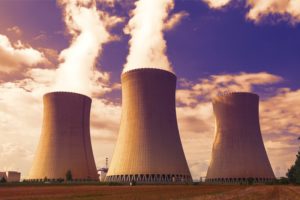Wednesday, February 6th, 2019
Stephan: Over the last week, three readers have written sending me various articles about how Bill Gates is pushing new nuclear technologies, asking what I thought about that.
I am utterly opposed to any civilian nuclear power technology currently available or being discussed. As I have said before virtually no one, and I include most Congress members, and all of the White House staff, seems to understand that civilian nuclear power was an evil bastard creature of the Cold War. It was brought to life to assure Westinghouse and General Electric that there would be enough nuclear technicians and engineers to maintain America's nuclear navy, and enough profit to justify the investment those corporations would have to make to develop workable nuclear reactors.
If few people know that, even fewer know that Admiral Hyman Rickover almost single-handedly created America's nuclear navy, against considerable resistance from the navy itself, until Admiral William Raburn and his team developed the first submarine capable ballistic missile, the Polaris, which allowed the defense triad upon which the nuclear Mutually Assured Destruction strategy was based.
And fewer yet know that Admiral Rickover requested that he be called to testify before Congress about civilian nuclear power as his last public duty. In that testimony, he stated unequivocally that civilian nuclear power was a bad idea that would create endless problems, never be truly profitable, and leave the U.S. with a huge waste problem. History has shown he was right about everything.
Here is a very good assessment of the current state of affairs and the absolute wrong-headedness of the Trump administration, in trying to keep this destructive industry going.
As to coal power: as this report makes clear anyone with an IQ bigger than their shoe size, except Trump, Pence, and the owners of the coal industry, knows that is a bad idea.

Credit: Shutterstock
The Trump Administration has responded to continued retirements of coal and nuclear units by proposing policies intended to prevent any further retirements of the traditional “baseload” fleet, under the premise that such retirements impair grid reliability, “resilience” and, more recently, national security. The first attempt at imposing a policy designed to deter retirements occurred when the U.S. Department of Energy (DOE) proposed a rule for Federal Energy Regulatory Commission (FERC) consideration in October 2017. That proposal, which would have required cost-of-service based payments to merchant coal and nuclear plants in certain Regional Transmission Organizations (RTOs) and Independent System Operators (ISOs) regions, was unanimously rejected by the FERC in January 2018. The FERC decided instead to examine the premise of grid resilience in greater depth at a regional level.
The second major policy attempt was described in a May 31, 2018 article by Bloomberg Energy, which revealed a draft memorandum (“Draft Memo”) by the DOE that outlined a proposal to prevent retirement of certain generation plants (“Subject Generation Facilities” or SGFs) that might, according to […]










